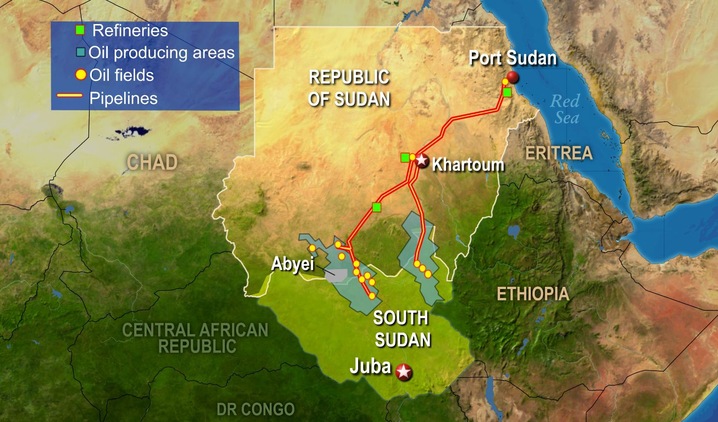Reports from South Sudan reveal that Juba could be in a serious economic crisis resulting from the ongoing war in the North.
Africa’s newest country suffers the outcome of the conflicts in North Sudan.
This is mainly because the civil war among the Arabs in the North impedes South Sudan’s oil exports.
Juba apparently, relies heavily on North Sudan’s oil pipelines to pump its oil exports, a commodity which is a major source of revenue for the government of South Sudan.
To access international markets, the oil is channeled to Port Sudan through two key pipelines.

Now as it happens, the problem is that one of the pipelines responsible for pumping two-thirds of South Sudan’s oil to international markets was vandalized by the fighting groups in Khartoum.
Most probably, it will take Khartoum months of costly and complex repairs on the pipeline to get the oil flowing again. But this is being hampered by the raging war.
This has left the South Sudanese government in great destitution, unable to meet some of its obligations such as paying salaries.
Reports that have reached The Tanzania Times are to the effect that the government in Juba has literally gone broke as the national currency continues to lose value.
Exporting oil through alternative routes of Mombasa in Kenya, or Djibouti on the Gulf of Aden could be another option, but this is very costly and not economically viable as it will mean relying on tankers, and the road connectivity to the two destinations is also poor.
In 2012, South Sudan was mulling a project to build a joint pipeline with Kenya which should pump oil from Juba to the port of Lamu, but until now it is not known when and why the deal was shelved.
Therefore, all efforts should be made to bring the civil war among the Arabs in the North to an end because it is currently choking South Sudan.
Apart from reducing many South Sudanese in a state of helplessness, the war also poses a major threat to the government in Juba because it could trigger an uprising when the people in the country begin to feel that the government is not meeting their needs.
The civil war in Khartoum is mainly between two major rival factions of the military government of Sudan.
The war which broke out in April 2023, involves fighting groups such as the Sudanese Armed Forces (SAF) under Abdel Fattah al-Burhan and the paramilitary Rapid Support Forces (RSF) and its allies (the Janjaweed coalition) under the Janjaweed leader Hemedti.
There are three minor (neutral) factions that are also participating in the fighting, including the Darfur Joint Protection Force; the SLM (al-Nur) under Abdul Wahid al-Nur; and the SPLM-N under Abdelaziz al-Hilu.
The war is mostly concentrated around the capital city of Khartoum, which is the largest and initial battle of the war and the Darfur region.
So far nearly 65,000 people have been killed within the Khartoum State alone.

